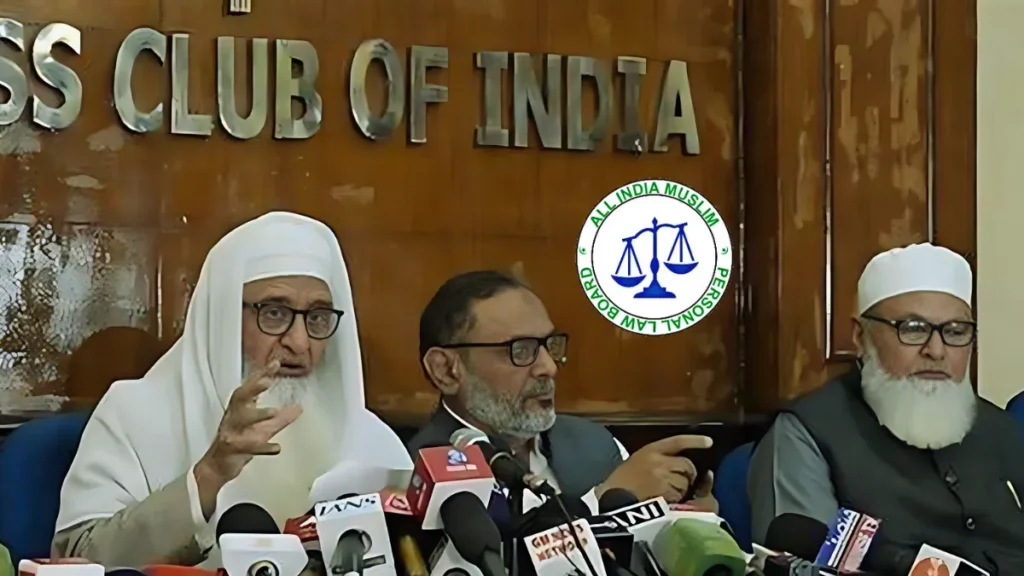AIMPLB Escalates Opposition to Waqf Bill with Nationwide Protests
On April 4, 2025, the All India Muslim Personal Law Board (AIMPLB) reaffirmed its unwavering opposition to the Waqf (Amendment) Bill 2025, announcing a series of nationwide protests and hinting at potential legal challenges.
This development follows the bill’s passage in the Lok Sabha on April 3, with 288 votes in favor and 232 against, marking a pivotal moment in India’s ongoing debate over Waqf property governance.
The AIMPLB, a prominent body representing Muslim interests, has labeled the legislation as a threat to religious autonomy, sparking a wave of public demonstrations and political reactions across the country.
The Waqf Bill, now under scrutiny in the Rajya Sabha, seeks to overhaul the management of Waqf properties—charitable endowments under Islamic law—by introducing reforms aimed at transparency and efficiency.
However, the AIMPLB argues that these changes undermine the community’s constitutional rights, igniting a fierce backlash that has drawn support from opposition parties and civil society groups. With tensions mounting, the board’s actions signal a critical juncture in the intersection of law, religion, and politics in India.
The Waqf Bill: Core Changes and Controversies
The Waqf (Amendment) Bill 2025 introduces several significant alterations to the existing Waqf Act of 1995, designed to address inefficiencies and disputes in property management.
One key provision eliminates the “Waqf by user” clause, which previously allowed land to be designated as Waqf based on long-term religious use, aiming to curb ambiguous claims. Additionally, it requires donors to have practiced Islam for at least five years and ensures women’s inheritance rights within Waqf properties, tackling gender inequities that have lingered for years.
Yet, these reforms have not come without contention. The bill also permits non-Muslims to serve on Waqf boards in administrative roles and reclassifies government-owned land mistakenly listed as Waqf, moves that the AIMPLB deems as overreach into religious affairs.
Critics, including the board, argue that such provisions violate Article 25 of the Constitution, which guarantees freedom of religion, fueling a broader narrative of governmental intrusion into minority rights.
AIMPLB’s Response: Protests and Promises of Action
In response to the bill’s passage in the Lok Sabha, the AIMPLB has mobilized its supporters, orchestrating large-scale protests that began in cities like Patna and Delhi earlier this month.
On April 3, 2025, the board’s president, Maulana Khalid Saifullah Rahmani, addressed a gathering in Hyderabad, declaring the legislation a “matter of life and death” for the Muslim community.

He urged followers to wear black armbands during prayers and participate in sit-ins, emphasizing that the fight is not just about property but about preserving religious identity.
Furthermore, the AIMPLB has hinted at pursuing legal avenues if the bill clears the Rajya Sabha, with spokesperson SQR Ilyas stating that the board is prepared to challenge it in the Supreme Court.
This multi-pronged approach—combining grassroots activism with potential litigation—underscores the organization’s determination to resist what it perceives as an unconstitutional attack. The board’s efforts have already gained traction, with thousands joining demonstrations and amplifying their message through social media campaigns.
Political Reactions and Alliances
The AIMPLB’s stance has found resonance among opposition parties, who view the Waqf Bill as a polarizing move by the ruling National Democratic Alliance (NDA). Leaders from the Congress, Samajwadi Party, and Dravida Munnetra Kazhagam (DMK) have rallied behind the board, accusing the Bharatiya Janata Party (BJP) of targeting Muslims for political gain.
Congress MP Sonia Gandhi labeled the bill a “direct assault on secularism,” while AIMIM chief Asaduddin Owaisi warned NDA allies like the Telugu Desam Party (TDP) and Janata Dal (United) of losing Muslim support if they back the legislation.
Conversely, the BJP has defended the bill as a progressive step toward modernizing Waqf administration without infringing on religious practices. Union Minister Kiren Rijiju, who introduced the bill, emphasized that it empowers marginalized Muslim women and ensures donations serve their intended purpose.
Despite this, the TDP and JD(U) have faced internal dissent, with two JD(U) leaders resigning in protest, highlighting the fragile coalition dynamics at play.
Public Sentiment and Street Demonstrations
The AIMPLB call to action has reverberated beyond political circles, stirring a groundswell of public sentiment across India’s Muslim communities.
In Delhi-NCR, authorities have increased security measures as the board plans a major rally near Jantar Mantar in the coming days, expecting thousands to participate. Similar scenes unfolded in Patna on March 26, where a “maha dharna” saw participation from RJD chief Lalu Prasad and his son Tejashwi Yadav, signaling broad solidarity with the AIMPLB’s cause.
However, not all reactions have been supportive. BJP leaders, including MP Jagdambika Pal, have accused the AIMPLB of “inciting divisions” and challenging parliamentary authority, a claim the board vehemently denies. Meanwhile, ordinary citizens remain divided—some see the bill as a necessary reform, while others echo the AIMPLB’s fears of eroded rights, reflecting the complex social fabric at stake.
What’s Next for the Waqf Bill and AIMPLB?
As the Waqf Bill awaits its fate in the Rajya Sabha, where the NDA holds a slim majority, the coming days promise intense debate and negotiation. The upper house has scheduled an eight-hour discussion, but the AIMPLB growing agitation could sway undecided lawmakers or escalate into a larger movement if the bill passes. Should it reach President Droupadi Murmu for assent, the board’s threatened legal challenge could prolong the controversy, potentially reshaping Waqf governance for years to come.
Moreover, the AIMPLB’s broader influence is under scrutiny. Established in 1973 to safeguard Muslim personal law, the organization has faced criticism for resisting progressive reforms, yet it remains a powerful voice for millions. Its current campaign against the Waqf Bill could either solidify its role as a defender of community interests or expose it to accusations of obstructing national development, depending on the outcome.
Why This Matters to India
The standoff between the AIMPLB and the government transcends the technicalities of Waqf property management, touching on deeper questions of identity, governance, and constitutional rights. With over 8.72 lakh Waqf properties registered nationwide, the stakes are immense, affecting millions of stakeholders who rely on these endowments for religious and charitable purposes.
The debate also tests India’s commitment to balancing modernization with its pluralistic ethos, a challenge that will define its social harmony in the years ahead.
For now, the nation watches as the AIMPLB leads its charge, blending peaceful protest with legal strategy in a high-stakes battle over the Waqf Bill 2025. Whether this movement succeeds or falters, its ripples will undoubtedly influence India’s political and cultural landscape, making it a story of profound significance
FAQs About the All India Muslim Personal Law Board (AIMPLB)
1. What is the All India Muslim Personal Law Board (AIMPLB)?
The AIMPLB is a non-governmental organization founded in 1973 to protect Muslim personal law in India, advocating for the community’s religious and legal rights.
2. Why is the AIMPLB opposing the Waqf (Amendment) Bill 2025?
The AIMPLB claims the bill threatens religious autonomy by altering Waqf property rules, including non-Muslim involvement and removing traditional designations, violating constitutional freedoms.
3. What actions has the AIMPLB taken against the Waqf Bill?
The board has launched nationwide protests, including sit-ins and rallies, and is preparing to challenge the bill legally in the Supreme Court if it becomes law.
4. How has the public responded to the AIMPLB’s protests?
Public reactions are mixed—some support the AIMPLB’s defense of rights, while others back the bill’s reforms, leading to widespread demonstrations and debates.
5. What could happen if the Waqf Bill passes the Rajya Sabha?
If passed, the bill would go to the President for assent, potentially becoming law, though the AIMPLB’s legal threats could delay or alter its implementation.

